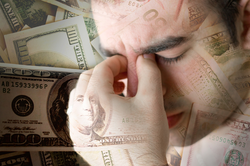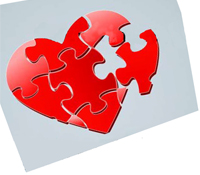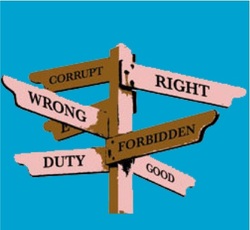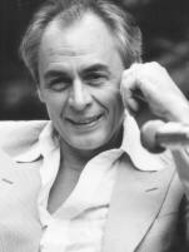 CAN HAPPINESS BE PURCHASED? Today we live in a world in which practically anything has a price tag and can be purchased. The question that I am posing in this blog is whether happiness also has a price tag and/or whether it can be purchased for the “right” price. Most of us have heard statements such as: I will be the happiest person if only I had that new car, jewelry, clothes, house, etc; or I will be happy if I am in a relationship. Our postmodern world and instant gratification culture certainly provides opportunities to buy objects of our desires, and certainly online dating can provide the latter as we potentially can pick the person of our choosing tailor-made and nicely packaged (size, shape, color, etc) for us. Are we happy though? Invariably the answer is “Yes”, at least for a short time until the excitement subsides. Today we live in a narcissistic world that is reproduced by ever increasing consumption. We consume objects, ideas, relationships, etc, each promising ever lasting excitement and happiness except that the excitement and ensuing happiness disappears very quickly and one has to look for other objects to consume, helping the cycle of capital to continue. The larger question is what is happiness? We generally say: I am happy. Happiness is a feeling not different from other feelings. Feelings are perceptions of emotions (by somatosensory cortex) which are bodily states. Most of us have noticed that when our body is tense and contracted we are not happy. Alternatively, when our body is relaxed and graceful we are happy. Usually we feel some level of happiness for as long as our body is relaxed and not tense. Happiness is also related to pleasure. When we feel pleasure we usually say that we are happy. And conversely when we are happy we sense pleasure in our body. Life is based on pleasure principle, otherwise it would have ceased to exist long ago. We homo sapiens are not an exception to the rule. Our life is based on the pleasure principle. However, due to our many traumas our bodies tense up and contract and we no longer feel the streaming of pleasure in our body. It then takes much work to restore the ability to feel pleasure to our body. Pleasure may cause us to feel anxious (pleasure anxiety). Just remember when we were little, when we had fun, and played and were joyful, we were told to be quiet and/or be still, etc, or were punished for it. We then tensed up our body to conform to the wishes of grown ups (our significant caretakers), reducing our abilities to feel pleasure. Alternatively, from an energetic point of view, one can also say that when the waves of excitement stemming from the inside of our body hit the tense and contracted musculature, the result is anxiety. Most of us may have experienced that after being happy and joyful for a while, all of a sudden we get a sense that something bad may happen which quickly ends our joy and happiness. In the absence of living a pleasurable life, we tend to seek excitement, the sensation of which creates short lasting streams of pleasure and happiness. But as the excitement fades away, so does the pleasure and happiness. And unfortunately this is the state of our society, that is seeking and registering intensities of stimuli as excitement which subside quickly, only to be replaced by others. We then become perfect consumers of goods who help reproduce our socioeconomic system. In this process our true self is denied, and instead we identify with images, ideas, etc, leading to a narcissistic existence. Happiness is the perception of pleasurable state of the body. Happiness can last long if our body is graceful and soft, when we are content and lovingly accept life. This however, does not mean that pain (due to illness or other unforeseen events) will not exist, but it means that in most cases pain will be short lived, and once the state of grace is restored to the body, pleasure and happiness return. Our body will be soft and graceful when we are self aware and express our feelings appropriately. Repression of feelings results in a contracted and tense body and is more associated with displeasure. In a graceful body state, breathing is pleasurable, and when our body is graceful, movement is pleasurable. When our body is soft and graceful, we can feel the pleasure of loving and being loved. In conclusion, I must state that happiness bought is nothing but narcissistic compensation for a life devoid of pleasure and body devoid of grace. "We deaden our bodies to avoid our aliveness and then we pretend to be alive to avoid our deadness" - Alexander Lowen, MD  LOVE, INTIMACY, AND ATTACHMENT My client came in looking better and not as disheveled as in prior sessions (I have seen him for a couple of months). He started sobbing almost as soon as he arrived in my office for which he apologized! I assured him that crying was part of his healing and that his tears would wash away his deep sadness. Once he calmed down a bit (a good two minute or so), I asked him how he was feelings. He replied, he felt utterly alone, except for when he is in the office with me. He mentioned that sometimes he felt there was no hope for him as his despair was just too great to bear, and he did not know how to handle it. He mentioned that he was questioning if life was worth living! I asked him to look out the window and see the beauty of nature, the mountains with snow on them, the trees, and the blue sky. He replied, they just reminded him of his past very difficult days, except perhaps watching the mountains with snow on them. He said to me that he felt he was living a false life in the past. “He had just been walking out there”, he said. He had lied to himself about his life and how bad he felt it was, he said. He spent time at his girlfriend's house whom he did not love, even though she assured him on many occasions that she loved him. He felt really bad about this as he felt he was using her as he did not have much feelings about her. He mentioned that since he started to work with me, he had become aware of the unreality of his life. He had to numb himself and live in a fantasy world (created in his mind) in order to be able to not feel the reality of his life and his (existential) pains. He then went on to ask how he could have the feeling he had in the office with me “out there”. At this point I had tears in my eyes which he noticed and started to cry softly. I replied to him that this would happen but it would take some time. He needed to experience his connection with me longer before he could feel it “out there”, I told him. I explained the neuroscience of human connections/relationships, in a simplified way, which he understood (I have noticed that when I explain the scientific reasons behind my clients' feelings, it reduces their shame regarding their symptoms). I further told him that he needed to “take” in his connection with me, my care and love for him, unconditional and nonjudgmental acceptance of him, and my empathy for him. In doing so new neural pathways would form in his brain that would correspond to this new experience and would fill the void that was left in his heart due to his early traumatic experiences. My statement put him at ease and he noticeably calmed down. I knew that he did take in the connection with me, as he was attaching to me very strongly. I have become an attachment object to him. I asked him if he could take in the love (to whatever extent) that his girlfriend was offering him. His reply was an immediate “no”. I asked him why was it then that he could take in my care and love for him. His replied you don't expect anything from me. You are just sitting here and don't need anything. I then asked him if the reason for this was that he felt that he needed to respond to her in some way, and needed to do something. His reply was “yes”. I asked him to imagine that he did not have to do anything about his girlfriend's love for him, and that he did not have to meet her expectations. Could he then take in her love for him? After taking some time, he then replied, yes he could. But if there were no expectations of me, he emphatically stressed. My hope for him was that if he could allow himself to take in her love for him, it could also create love in him (for her) over time. Most people with oral deprivations in early infancy suffer from conflicting conditions. On one hand they long for connection and contact, but at the same time when contact is offered they reject it and/or become enraged. This is analogous to a baby who wants the breast and cries profusely, but when the breast is finally offered he bites it. I would like to emphasize the profound statements made by this client. He did not experience unconditional love from his mother for which he longs but cannot receive it when it is offered as his mother's love (if there was any) for him was always conditional. This is the reason why experiencing and eventually accepting of my unconditional love and care (along with optimal frustration which is necessary for growth and eventual separation) for him is so crucial in his healing. This is the re-parenting that is talked about in object relations theory. Here comes my responsibility as a therapist. In my work with him, I have awakened his longing for contact, for love, and for connection. I have to accept that and remain present with him, and “optimally” frustrate him, albeit unintentionally, so that he can “grow”, and eventually internalize his connection/relationship with me. I need to be able to tolerate his infantile attachment to me, and not be scared by it. I also need to process my own feelings and what comes up for me when I am an attachment object to him. My own past traumas will possibly be triggered, albeit to an imperceptibly small degree as I have worked through my traumas over the past years. I also have to be able to tolerate his oral rage toward me when it finally is activated. Also he needs to accept the limitations of my care and love (He cannot take me home with him!). Eventually I will (inadvertently) let him down, which may evoke his anger and rage toward me, similar to the baby who longs for the breast but then bites it when it is offered as the baby cannot tolerate frustration. Wilhelm Reich, MD says: The root cause of all neurotic disturbances are disappointments in love. I believe this to be true, and it is the task of therapy to mend the cuts and heal the wounds. And Robert Hilton, PhD says: We were all wounded in relationships, therefore it takes a relationship to heals us. I will end this post with a quote from Ronald David Laing, MD (The Divided Self): (This quote is about a schizophrenic patient who has recovered) “It was terribly hard for me to stop being a schizophrenic. I knew I didn't want to be a Smith (her family name), because then I was nothing but old Professor Smith's grand daughter. I couldn't be sure that I could feel as though I were your child, and I wasn't sure of myself. The only thing that I was sure of was being a 'catatonic, paranoid and schizophrenic'. I had seen that written on my chart. That at least had a substance and gave me an identity and personality. [What let you to change?] When I was sure that you would let me feel like your child and that you would care for me lovingly. If you could like the real me, then I could too. I could allow myself just to be me and didn't need a title.”  WHAT IS SELF LOVE? Yesterday one of my clients, who is facing many life challenges, asked: “What is self love?” I asked him to explain what an ideal loving mother would do for her infant/child. He replied: “She would nurture her baby, nourish him, hug him and give him contact, she would unconditionally love him, accept him with empathy, would not judge him, she would respect the young human, she would put the child in his bed with kindness when he is tired, she would not hurt/harm him emotionally and physically, she would have empathy for him and his growing pains and thus would know when he is in need of connection and contact and can provide it for him.” I then told him, when one treats oneself just like this ideal mother would treat her young child, one loves himself. Thus we love ourselves when we are aware of our needs and our state of mind/body, can freely express ourselves, have compassion for ourselves, will not do anything that harms our body/mind, take care of ourselves when we need rest, and nourish/nurture ourselves when needed, will not judge ourselves and are kind to ourselves, etc.. Incidentally, I told him that love for another starts from love of the self. If one cannot love oneself, love for the other is merely an infantile attachment or passing infatuation and not mature love. HOW TO LOVE THE SELF? Now that I know what self love is, how can I learn to love myself, my client asked. I told him that he could not learn to love himself anymore than he could learn to feel any other feeling. Feelings occur spontaneously. We thus cannot learn to love someone or ourselves. He asked me how he can develop self love then. I mentioned to him that when an infant/child experiences the unconditional love, nonjudgmental acceptance, empathy, and care of his mother, he develops the sense that he must be good and he must be lovable and worthy of love. He than will love himself because he has experienced love. Viewed differently, if he experienced all these he would internalize his mothers love and would then love himself. But if an infant/child did not experience these, he would search for love in vain for the rest of his life to compensate for what he did not receive, and would consequently suffer man heartbreaks. Or defensively, he might close his heart completely to love. He then told me that this is very depressing. Are you telling me that I can never love myself if I did not receive what I needed from my mother? It is not so bad, I replied. You can still develop self love and become a loving person. How, he asked? I said to him we were all hurt in a relationship, it thus takes a relationship to heal us. I told him that he needed to feel my care and love, nonjudgmental and unconditional acceptance, and my empathic attunement to him, and be able to take them in over time and once his trust was established. He needed to feel that I am impacted and touched by his experience of life. In other words he needed to receive from me what he did not receive from his mother. If he was able to take these in for long enough time he would internalize them and would then be able to love himself and can become a loving person. Or from a neuroscience point of view new neural pathways will form in his brain that would correspond to this new experience, one of being seen for who he was and in a caring and loving way. He asked why couldn't he get these in a romantic relationship? I replied, that romantic love was not unconditional, nor would it be necessarily healing. He would have responsibilities in a romantic relationship. But in his therapeutic relationship with me, he needed to just receive my loving presence and empathy and did not need to do anything. He did not need to care for me anymore than an infant/child did not need to love and care for his mother. The love of the mother was just there for him to enjoy. He asked how I was touched by his experience, to which I replied that when he shared a deep shame evoking experience with me, I had tears in my eyes which he noticed and which resulted in a shift in him. His shame disappeared as he felt seen non-judgmentally by me and felt my empathy. He felt that my heart as well as his were touched, and we resonated (limbic resonance) in that session. But as a therapist I also have responsibilities. Once I show my care, empathy and loving presence to a client, I may open up his longing for contact and connection which I cannot fulfill, nor should I. I need to take responsibility for this and accept the consequences of it, and also accept my helplessness to rescue him as he is an adult and ultimately responsible for himself. This is an important part of healing. Many aspects of what I am discussing here are part of relationally based therapies, but they also include a feminist therapeutic model which posits that therapy is mutually transformative. It is not just the client that transforms, therapist is also transformed in the process. This is based on this new egalitarian model of therapy. I would like to end this with a quote from my therapist/teacher/mentor Dr Robert Hilton (Relational and Somatic Psychotherapy): “We are whole beings, heart, soul, and sexuality. This wholeness and sense of well-being is maintained through the empathic core relatedness of our caregivers, and more importantly, in their desire to repair misattunement. When this repair does not take place, we become divided and split from our original spontaneous selves ... If misattunment divided us, it is empathic attunement that gives us the possibility of recovery. This kind of attention causes us to feel the preciousness of our souls and the true value of our love ... We slowly become free to choose, love and express our separate and true selves.”  Genealogy of Morality and Moral Codes (Homayoun Shahri, PhD, MA, LMFT) Morality is defined as a set of principles and system of values concerning what is “right” and what is “wrong”. We can all appreciate that morality changes from society to society, historical era to historical era, etc. Thus we have morality of the 19th century vs that of the 20th century, and we have the Christian morality vs Islamic morality, and for example morality in Saudi Arabia vs morality in Sweden. They are all different. Thus to take morality as the way it relates to existing code of conduct, may negate the existence of a universal code of conduct and morality. The 18th century German philosopher Emmanuel Kant attempted to answer the question of universal morality by describing what he called “categorical imperatives” which were a set of principles and values that Kant believed were universally applicable as moral codes of conduct. However, since text can only refer to text (in postmodern deconstructionist thinking of Derrida), Kant's categorical imperatives cannot refer to anything absolute and immutable as he and modern thinkers believed, as text is subject to interpretation. Aside from Kantian ethics and morality specified in categorical imperatives, moral codes were designed to insure and preserve the current socioeconomic system both at a micro level (within the family and the individual) as well as a macro level (within the society). Thus the moral codes are designed to reproduce the current and dominant relational transactions within the socioeconomic system and preserve the power hierarchies. The individual members of the society are then relegated to a position in which there is no need to take responsibility for their own behaviors and actions, as long as the moral codes (some of which are enforced by laws) are followed. This is Nietzsche's point in the statement: “Morality is herd-instinct in individual”. He divided the society into the supermen (Ubermensch) and the “herd” who follow them. The supermen have transcended good and evil, and are beyond moral codes. They define the moral codes based on their own belief system and to keep the herd in check to reduce their anxieties (related to taking responsibility for their lives). And for the “herd”, as the moral codes weaken, chaos (within behavior) ensues, as evident in this era of human existence. Wilhelm Reich introduced the term “Natural Morality”. He believed that human organism, if not split from its unitary function (mind-body, thinking-feeling, etc), is self regulating. Natural morality will then be the set of all actions and system of values that support self regulatory function of the human organism. These natural codes increase aliveness and motility, promote life in general (of all sentient beings on the planet), increase pleasure and reduce pain, etc. Reich believed that a successful therapy should end when the patient has achieved self regulation and can decide for himself what is right and what is wrong without needing the herd based moral codes of the society. Natural morality may also be deconstructed were it not for its connection to the bodily feelings, which are not text and do not refer to text, and thus are not subject to interpretation. Feelings defy definition but we all have a felt sense of what they are. If one reads the works of famous anthropologists like Margaret Mead or Branislaw Malinowski, which indicate that violence and destructiveness may not be innate in human animal but may be related to patriarchal that authoritarian upbringing, in which all natural and healthy instinct of the child is repressed. Violence simply did not exist (in the same way as today) in matriarchal societies. There was thus no need for introduction of moral codes. Perhaps we should strive toward building a modern version of matriarchal societies which will necessarily be egalitarian, and power hierarchies will not exist. Authority will be based on knowledge and not power. Wealth will be based on one's happiness and ability to enjoy life and not monetary wealth. Am I a Utopian? I don't believe so. This, in primitive form, did exist once during the brief presence of our species on the planet, that gives me hope ... But in the mean time the question is what is to be done, so that we can enjoy our lives but also strive in this direction. This comes from my humanism and love of humanity despite its flaws and destructive behavior. Perhaps all that can be done is to pass the word along, hoping that more and more people can hear. The only hope may be with children, as most of our adults are beyond help and their "core" cannot be reached. In other words they are far gone. But perhaps a generation of healthy children can reverse the destructive trend. Although, looking at today's children, I am not hopeful at all, as their aliveness is even less that our generation!!! This is one of the reasons why I left the field of engineering and entered the field of psychotherapy, despite major financial impact. Dr. Scott Baum presents an understanding of the development of psychopathy as a defensive organization and as character structure from a bioenergetic developmental perspective. He discusses the clinical manifestations of these psychological organizations and the challenges to the therapist in working with people dealing with these personality problems. The presentation is most suited for use by therapists. Dr. Baum is a licensed Clinical Psychologist and a Diplomate in Clinical Psychology. He is also a certified Bioenergetic Therapist, and a member of the Faculty of The International Institute for Bioenergetic Analysis. He has been affiliated with the DiMele Center for Psychotherapy since 1994. Scott Baum views psychotherapy as an experiential, problem solving process. He believes that the deepest, fullest, and most complex understanding of a person’s problem yields the best, most creative and enduring results. Audio level and quality is not very good, but still quite audible. This 3 part YouTube video is very much worth watching. I have attended several workshops by Dr Scott Baum and highly recommend these presentations. Carl Jung was born on July 26, 1875, in Kesswil, Switzerland. Jung believed in the “complex” or emotionally charged associations. He collaborated with Sigmund Freud, but disagreed with him about the sexual basis of neuroses. He founded analytic psychology, advancing the idea of introvert and extrovert personalities and the power of the unconscious. He wrote several books before his death in 1961. Jung's growing reputation as a psychologist and his work dealing with the subconscious eventually led him to the ideas of Sigmund Freud and the man himself. Over a five-year period, beginning in 1907, the two men worked closely together. Jung was widely believed to be the one who would continue the work of the elder Freud. Viewpoints and temperament ended their collaboration and later their friendship. In particular, Jung challenged Freud's beliefs around sexuality as the foundation of neurosis. He also disagreed with Freud's methods, including his assertion that the elder psychologist's work was too one-sided. The final break came in 1912 when Jung published, "Psychology and the Unconscious," which took head-on a number of Freud's theories. After a pause during World War I, Jung picked up his work again, and for the next four decades traveled the globe to study different cultures. His later work led him to what he called "individuation," a process he described as being a melding of the conscious and unconscious. Through it the person develops into his her own "true self." In 1932 Jung was awarded Zurich's literature prize. Six years later he was elected honorary fellow of England's Royal Society of Medicine. In 1944 he was named an honorary member of the Swiss Academy of Medical Sciences. AMYGDALA - The amygdala (Latin, corpus amygdaloideum) is an almond-shape set of neurons located deep in the brain's medial temporal lobe. Shown to play a key role in the processsing of emotions, the amygdala forms part of the limbic system. In humans and other animals, this subcortical brain structure is linked to both fear responses and pleasure. Its size is positively correlated with aggressive behavior across species. In humans, it is the most sexually-dimorphic brain structure, and shrinks by more than 30% in males upon castration. Conditions such as anxiety, autism, depression, post-traumatic stress disorder, and phobias are suspected of being linked to abnormal functioning of the amygdala, owing to damage, developmental problems, or neurotransmitter imbalance. Joseph E. LeDoux, PhD, is a neuroscientist whose research is primarily focused on the biological underpinnings of emotion and memory, especially brain mechanisms related to fear and anxiety. R.D. Laing - BBC Radio 4 Extra  A key figure in the 60s, influential psychiatrist R.D. Laing tells Professor Anthony Clare about the major influences on his life. Ronald David Laing (7 October 1927 – 23 August 1989), usually cited as R. D. Laing, was a Scottish psychiatrist who wrote extensively on mental illness – in particular, the experience of psychosis. Laing's views on the causes and treatment of serious mental dysfunction, greatly influenced by existential philosophy, ran counter to the psychiatric orthodoxy of the day by taking the expressed feelings of the individual patient or client as valid descriptions of lived experience rather than simply as symptoms of some separate or underlying disorder. Laing was associated with the anti-psychiatry movement, although he rejected the label. Politically, he was regarded as a thinker of the New Left. Ronald D. Laing's work was centered on understanding and treating schizophrenic patients. He could perhaps best be termed an "existential psychiatrist." Indeed, one of his early books was on Jean-Paul Sartre, and he used concepts from Sartre, Hegel and others in endeavoring to conceptualize the life and world of the schizophrenic. Laing himself grew up in a bizarre family setting. His parents forbid him to go out of the house alone or play with other children until middle childhood, they repeatedly conveyed the message to him that he was "evil," and when he went out with them he was kept on a leash with a harness. His childhood environment was such as to cause him severe confusion about which thoughts and feelings were his own, and which were "mapped onto" him by his environment. As an adult, he was himself schizophrenic for periods of time, spending some time as a patient in psychiatric wards. As such, he gained a perspective on schizophrenia which was unusual and perhaps even unique for a psychiatrist. That is, he truly understood what the schizophrenic's world looked like from the inside, as well as from the outside. He also had gained, from his own experience, a sense of the kind of situations in family, school, etc., that could drive a person crazy. Laing worked at Tavistock clinic in London with J. Bowlby and D.W. Winnicott. These rare clips are from the BBC archives, parts of which are featured in Adam Curtis' film Century of the Self. Alexander Lowen (December 23, 1910 – October 28, 2008) was an American physician and psychotherapist. A student of Wilhelm Reich in the 1940s and early 1950s in New York, he developed bioenergetic analysis, a form of mind-body psychotherapy, with his then-colleague, John Pierrakos (February 8, 1921 – February 1, 2001). Lowen was the founder and former executive director of the International Institute for Bioenergetic Analysis in New York City. Born in New York City, Lowen received a bachelor's degree in science and business from City College of New York, an LL.B and a J.S.D (a doctorate in law) from Brooklyn Law School. His interest in the link between the mind and the body developed during this time. He enrolled in a class on character analysis with Wilhelm Reich. After training to be a therapist himself, Lowen moved to Switzerland to attend the University of Geneva and received his Doctorate in Medicine (MD) in 1951. Alexander Lowen met Wilhelm Reich in New York in 1940, and trained with him until 1952. He studied Reich's energy principles and character analysis. He also had personal therapy with Reich from 1942 to 1945 before becoming a Reichian therapist himself. In 1953, he split from Reich and his research on the "orgone". Lowen then developed "Bioenergetic Analysis" as his own creative contribution to help people clarify the complexity of the mind-body split. Lowen lived and practiced for the majority of his life in New Canaan, Connecticut. He suffered a stroke in July 2006. The Alexander Lowen Foundation was founded in April 2007 to continue his legacy. Lowen died on October 28, 2008 at the age of 97. Books authored by Dr Alexander Lowen:
The present findings suggest a new technique to target specific fear memories and prevent the return of fear after extinction training. Using two recovery assays, we demonstrated that extinction conducted during the reconsolidation window of an old fear memory prevented the spontaneous recovery or the reinstatement of fear responses, an effect that was maintained a year later. Moreover, this manipulation selectively affected only the reactivated conditioned stimulus while leaving fear memory to the other non-reactivated conditioned stimulus intact. It has been suggested that the adaptive function of reconsolidation is to allow old memories to be updated each time they are retrieved. In other words, our memory reflects our last retrieval of it rather than an exact account of the original event. Daniela Schiller, Associate Professor, Mount Sinai Hospital on groundbreaking research on memory , and whether we might enable us to block highly traumatic memories. Here is a good article on this same subject published in New Yorker by Daniela Schiller: http://www.newyorker.com/magazine/2014/05/19/partial-recall |
AuthorHomayoun Shahri Archives
May 2016
Categories
All
|
Ravonkavi Privacy Policy
©2018 Ravonkavi
©2018 Ravonkavi

 RSS Feed
RSS Feed